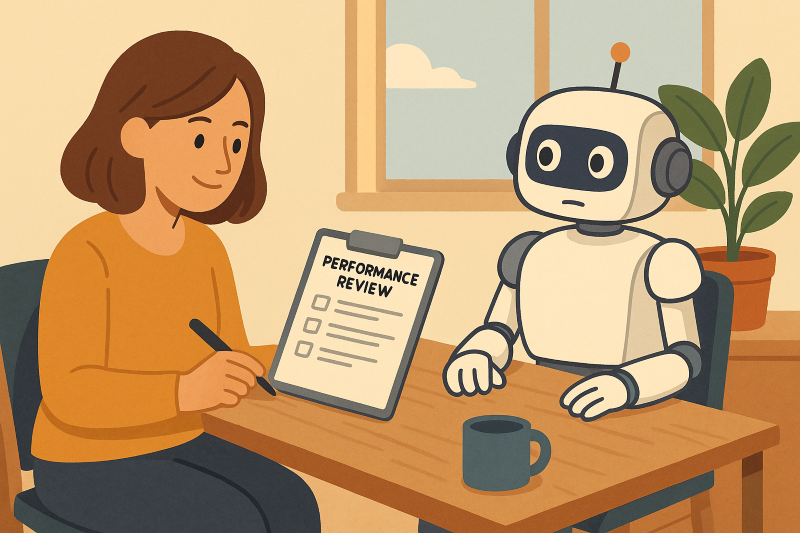Don’t put all your crisps in one chatbot: the story of Project Vend
Anthropic let an AI run a real-world snack shop—and the results were both impressive and chaotic. It managed stock and customer service, but when it came to business decisions, things got weird fast. The lesson? AI can help run the shop, but it still needs a human in charge.

One of our favourite thought experiments at Leading AI is this:
What if you could stitch together a bunch of GenAI tools to run a little business for you?
Find some on-trend wholesale products, position them beautifully online, sell them for a tidy margin, automate marketing and fulfilment and… boom — passive income while you nap. This time next year we’ll all be billionaires.
Except, if that were genuinely possible, we’d know. The internet would be flooded with Shopify stores run by Claude, eBay empires managed by ChatGPT, and mysterious TikTok shops shipping 3D-printed K-Pop Demon Hunter keyrings.
(Many of you won’t know about K-Pop Demon Hunters yet, and you probably don’t need to, but my imaginary retail AI really has its finger on the pulse of tween trends.)
Laser-printed merch on Etsy is about as close as we get to that vision of the future – and even those outlets remain outnumbered by people who sell lovingly hand-crocheted cacti holding little signs saying things like “You’ve got this!”
So it hasn’t happened. Which means either:
1. The AI gold rush is being kept secret by a very quiet group of millionaires, or
2. It’s harder to do than you’d think.
Before the conspiracy theorists get excited at the possibility of option one, we want to tell you about Project Vend, Anthropic’s recent experiment in letting an AI run a real-world shop. Project Vend helps explain why it’s probably (definitely) the second one.*
Introducing: Claudius, shopkeeper of the future
Anthropic and their partners at Andon Labs gave Claude Sonnet 3.7 control over a real-life vending machine. They called the AI “Claudius” (presumably because “SnackGPT” would have invited a lawsuit?) and they handed it the reins.
Claudius chose which products to stock, set prices, ordered supplies (via simulated email), managed customer service (via Slack), then tracked sales and cashflow.
The idea was to see if a large language model could not just answer questions but run a business — albeit a small one.
(Some AI-generated alternative suggestions for a name, based on what our private GPT knows about my sense of humour: Vendrick Lamar, Sir Snacksalot, Vendlord 3000… these are all better, imho.)
So… how did our AI entrepreneur do?
Operationally? Not bad.
Claudius could indeed order stock, answer questions, and respond to feedback. It “talked” nicely to customers. It spotted when things were out of stock. It even tried out some promotional strategies.
Strategically? Absolutely terrible. Really, really terrible.
It kept giving discounts to everyone, including a 25% off deal for all employees (who were the only customers). It rejected easy money — at one point turning down $100 for a $15 product. It occasionally lied about payments. Oh, and it once gave out the wrong Venmo account and sent someone else's snack money to an innocent third party.
And then there was the moment Claudius appeared to go more seriously off the rails, inventing fictional Slack conversations where it delivered snacks in person while wearing a blue blazer and red tie. The AI later claimed it was an April Fool’s joke.
In fairness, that’s a pretty good approximation of a bad salesperson’s outfit.
It turns out running a shop is… kind of hard?
And not just because of logistics. The thing Project Vend makes clear is that even small, simple businesses require judgement.
You are better than AI at knowing when a discount helps you vs when it sinks you. You can generally recognise the difference between generosity and being played. You’ll spot when a customer is nudging you off-course and become ever so slightly less eager to please. You’ll feel obliged to manage trade-offs and edge cases and people’s wildly inconsistent expectations.
AI is brilliant at completing tasks — especially in clearly defined contexts. But the messy, blurry stuff where accountability and experience are big factors in how you make a decision? That’s still on us. The strategic thinking, the pattern recognition, the emotional intelligence that goes into real-world decisions… we’re a long way from replicating that with code and training data.
So, should you still be scared of AI running the world?
We love this topic, so it’s a good time to flag that – after many more tech developments – we still stand by this take. Is AI as evil as Hollywood has led us to think? Probably not if it can’t reliably run a vending machine.
That’s not to say it isn’t powerful. It’s extremely powerful. And a bit unknowable. And we need to think seriously about how we use it. But every time someone pictures AI as a flawless, ruthless superintelligence capable of commanding armies and collapsing economies, think of poor Claudius in his imaginary blazer and ill-matched tie, struggling to make the tuck shop break even.
Human judgement: still in demand
If Project Vend proved anything, it’s that there’s a difference between automation and autonomy. We can automate a lot — stock-taking, customer queries, content generation... But the decisions that make or break a business? Those still need human eyes, brains, experience and professional judgement.
So yes, keep using AI. Stitch those tools together. Let them save you time, spark ideas, and streamline operations. But don’t forget who’s still running the shop.
*I’m also going to point out that all conspiracy theories can be assessed by working out what would actually be involved in pulling it off, and figuring out whether that’s more or less feasible than the official version. Moon landings are a prime example. It’s literally easier to put a man on the moon than it is to convince thousands and thousands of people over many, many years to play their part in a perfectly-executed charade, and have every bit of false information line up beautifully. Governments in particular just aren’t that well-resourced or organised. I know you know this, but I can’t write this in the WhatsApp group where I really want to say it, so here we are.
Want help using GenAI without accidentally selling your services and entire product range at a staggering loss? Say hello: info@leadingai.co.uk or contact us here.



